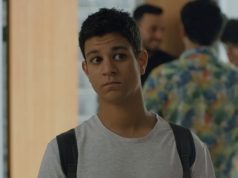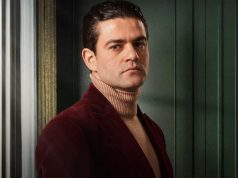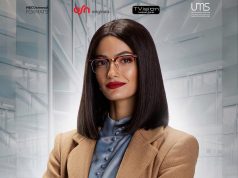on Film, Motherhood & Life
By Francesca Sullivan
Like many movie stars, Mona Zaki’s substantial presence on screen is counterpoint to her physical reality. In person she is small and slight, and although she will hit forty next year, still decidedly young and girlish in loose, casual clothes and no make-up. But those luminous eyes and the curling smile that have so often lit up the screen, also light up the spacious room around her. A room that reflects the cultural and educational diversity of her background, with a host of African sculptures (“When I went to South Africa” she reveals, “I got this feeling in my heart that I’d landed somewhere so me.”) and modern fixtures that include light shades containing motifs of the protests in Tahrir Square.
Her father was a university professor, and she spent part of her education abroad, including a stint at an English boarding school. She admits that there are downsides to such opportunities, reflecting that it can make it harder to feel truly at home anywhere. “When I was abroad I always felt I was different, and when I came back here I still felt different.” Yet it has obviously made her into an open-minded, cultured person, and perhaps even contributed to her ability to explore different roles so successfully.
The large windows of her villa in west Cairo look out onto a garden and swimming pool, around which paces an enormous St. Bernard. Meanwhile a much tinier lap-sized dog cavorts at her feet, while from somewhere upstairs can be heard the sound of the most recent joy in her life: her four month old baby son, Selim.
Surrounded by this idyll of domestic normality, not to mention her easy, friendly manner, it’s easy to forget that Mona Zaki is one of the Arab world’s top movie stars. Married to Ahmed Helmy (they have long been Egypt’s most popular celebrity couple) and with a pedigree of hit films behind her, Zaki has rarely put a foot wrong in her illustrious career. If you have been wondering why she’s been absent from the big screen of late, however, she has a good reason – and it’s not all about the birth of her second child. All over town, cinemas are finally showing Aswar el Qamar the long awaited film by Tarek el Arian that has been six years in the making, in which she stars as a blind woman whose past catches up with her.
Two years after our last interview it was Cairo East Magazine’s turn to catch up with her, and ask her about motherhood the second time around, and why it has taken her new movie so long to be released.
CEM: Tell us about Aswar el Qamar, and your experience of being part of it?
MZ: From the beginning I felt honoured to work with Tarek el Arian, a director whose work I had long admired. The story drew me to it because it deals with an interesting idea: the way people always wish for what they don’t have, but once they get it they realize it was the wrong choice. I loved the idea that by following the third eye and your instincts you end up seeing the world from a different perspective.
We began filming the movie six years ago. The actual shooting took three years, and the post production more than two years. There were a lot of technical difficulties involved. Most of the film takes place on a yacht in the Red Sea, and we had problems with the weather, and other logistics. We are not very equipped in Egypt for this kind of shooting, whereas in Hollywood they would have built a special set for it complete with water, we started out by shooting it all in a real context. Ironically by the end, the technical crew ended up creating the set after all. For me, to hold onto a character for three years was very challenging, and during that time I didn’t feel able to take on any other role, as that would have made it even harder. Once I’d ‘captured’ the character I needed to hang onto her, and I was frustrated at it taking so long. But now that I’ve seen the result I don’t regret it; it was all worth it.
What was it like playing a blind woman, and how did you prepare for the role?
By good luck, prior to shooting there happened to be a Lee Strasburg-trained acting coach in town, running a course. I enrolled, and was able to sneak some time with him during breaks to pick his brain specifically about the challenges of playing someone blind. I also talked with Dr. Hazem Yasin, an eye specialist, about the mannerisms of blind people. How your neck moves in a different way because you are constantly turning your ears towards sounds. He gave me a pair of opaque contact lenses to wear, which make you unable to see, and though it’s not possible to wear them during filming, I practised with them and videoed myself to watch how I behaved. It was fascinating to discover how much more I heard when I couldn’t see. Your other senses take over and become more tuned in.
On set I needed to let myself go completely from being aware of what was around me, but that meant that the other actors had the added tension of having to take care of me. I’d walk into things; there were often painful accidents! But being blind was only one aspect of a multiple role. The blindness was just the base, while the character was also feeling lots of other things.
Do you have a preference for movie acting over TV or stage?
I do love making movies. Maybe it’s the way that you give your full attention to each and every sentence in the script, because each one is filmed multiple ways from different camera angles. In a TV series there is no time for this; you have to shoot a whole scene in one go. I love the way movies are watched, with full concentration in a dark place, not filled with the distractions around a TV set. It seems to give the story more weight, and you involve more of your own emotion while watching. I am speaking as a viewer too, not only as an actress.
I haven’t done theatre for ages – not since before I was married! But that doesn’t mean I wouldn’t love to, given the right production. There’s nothing quite like getting feedback on a daily basis from a live audience. Unfortunately, the private sector of Egyptian theatre has practically ground to a halt, and even the public sector doesn’t really provide much scope for actors.
Are there any favourite roles that you cherish?
After playing any role I let it go completely, whether it was a positive experience or not. I put it behind me and move on. Having said that, I still treasure playing opposite Ahmed Zaki in Days of Sadat and Et-hak, Alashan el Sura Tetla Helwa. And I am glad that I did Ehkhi Sheherazade with director Youssry Nasrallah, a respectful movie that looked at domestic abuse. It got a standing ovation at the Vienna Film Festival.
Tell us about how motherhood is for you this time around?
It definitely feels different. From dealing with an almost-teenager (my daughter is eleven) I’ve found I’ve forgotten how to deal with babies – and a different sex too. It does make a difference, especially when changing nappies! I think I actually had more tolerance when I was younger, but I also feel that as an older mum you are more emotionally developed, which I think gives you extra feelings to give to the baby. One thing is for sure, I’m much more laid back. I don’t panic any more at the slightest thing.
What is next for you work-wise?
I’ve started to prepare a new film with director Hany Khaleefa, called Cairo Mecca. It’s written by a new script writer called Mohamed Ragae, who seems really promising. I can’t say much, but the story is about how people doubt God’s forgiveness for their sins. The project is still at the casting stage.
How do you choose the roles you take?
I have a passion for my job, and I choose roles for different reasons. Sometimes purely for their entertainment value, and sometimes because there’s a cause behind them that I believe in.
Have you ever considered co-starring in a movie with your husband?
We get sent a lot of scripts, but what always happens is either he or I reject them for one reason or another, usually because the character doesn’t grab us. Also maybe because we live together, we don’t really feel the need to act together as well!
Quick Fire-Round:
Night person or morning person?
Morning. I might have been a night person once, but those days are long gone. I even have difficulty staying awake when we are out socializing in the evenings.
Sand or snow?
Sand – big time. I’m not into the cold, I’m from Africa, remember.
Beauty and exercise routine?
I try to find time for daily creams and skin maintenance, and I’m into sports. I exercise with a personal trainer who comes to the house. Most of all though, I meditate daily.
Tea or coffee?
Neither, I don’t take caffeine.
Five essentials you never travel without?
Comfortable shoes, an Egyptian loofah, flip flops, an over-the-shoulder messenger bag, and a good book.
Favourite store?
Ghazl Banat, clothing boutique.
Favourite restaurant?
I hardly ever eat out, but maybe Saffron, and Seasons Bistro
Song on repeat?
Angham’s new song, released for Valentine’s Day.
Last holiday destination?
Beirut.
The last person you dialled on your phone?
My daughter. She’s on her way home from school.
Best relationship advice?
Don’t think ‘me’ all the time, think ‘we’.





